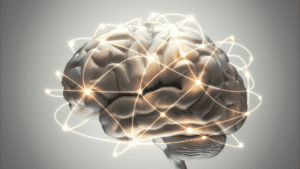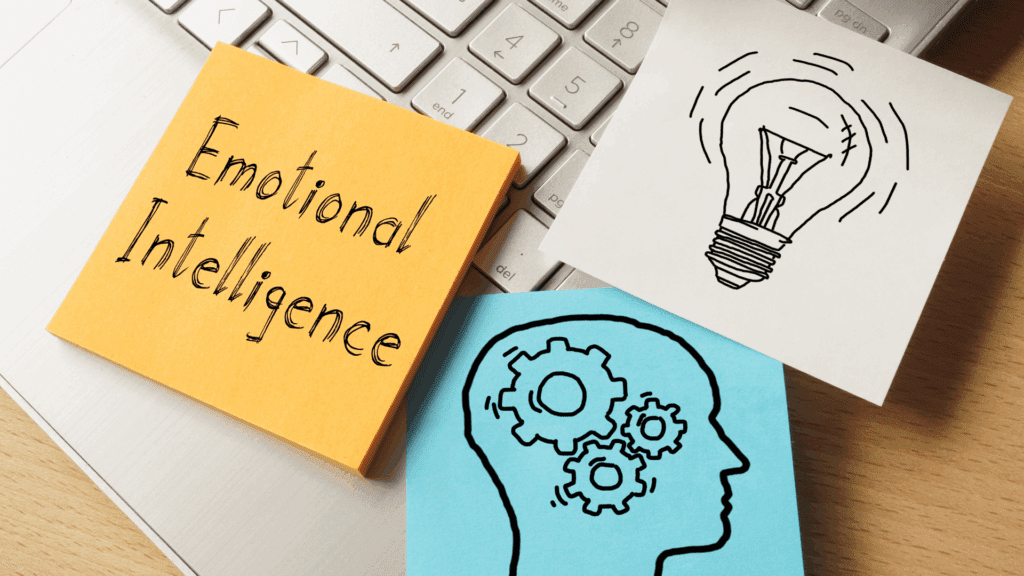In the intricate world of neuroscience, the term emotional intelligence, commonly abbreviated as EI, stands out as a cornerstone in understanding human behavior and interactions. Emotional intelligence is our innate ability to perceive, comprehend, and regulate our emotions, as well as to empathize with the emotional states of others. Contrarily, EQ, or Emotional Quotient, serves as the metric that quantifies this ability, drawing a parallel to how IQ gauges cognitive prowess.

As we delve deeper into the neural mechanisms underpinning EI, the concept of neuroplasticity emerges prominently. This remarkable feature of our brain signifies its adaptability and resilience, allowing it to forge and reconfigure neural pathways throughout our lifespan. Such plasticity is instrumental in cultivating and refining our emotional intelligence, offering insights into how our brain evolves in response to emotional experiences.
Incorporating a neuroscientific perspective transforms our understanding of EQ from merely a psychological construct to an exploration of our brain’s dynamic capabilities. Recognizing the interplay between emotional intelligence and the brain’s malleable nature provides a comprehensive blueprint for achieving a more fulfilled and harmonious life.
Understanding the Core of Emotional Intelligence
Emotional intelligence, at its essence, is the ability to perceive, understand, and manage our emotions while also being sensitive to the emotions of others. But what drives this ability? The answer lies deep within our brains.
Delving into the Neuroscience Behind High Emotional Intelligence
Recent studies have shown that individuals with high emotional intelligence often have a more active prefrontal cortex, the region of the brain responsible for complex cognitive behavior and decision-making. This heightened activity allows for better emotional regulation and understanding.
The Brain’s Role in Shaping Our Emotional Landscape
Our brain is a complex network of interconnected regions, each playing a role in our emotional responses. The amygdala, for instance, is crucial for emotional dysregulation, processing our reactions to emotional stimuli. When we experience strong emotions, it’s the amygdala that first responds, sending signals to other parts of the brain. However, it’s the interplay between the amygdala and the prefrontal cortex that determines our ability to handle these emotions effectively. A well-balanced communication between these two regions leads to higher emotional intelligence, allowing us to navigate the challenges of life with grace and understanding.
Incorporating these insights, it becomes evident that our emotional landscape is deeply rooted in the intricate workings of our brains. By understanding the neuroscience behind emotional intelligence, we can better harness its power for personal and professional growth.
The Five Pillars of Emotional Intelligence Explored
Emotional intelligence is not just a singular concept; it’s a multifaceted skill set that can be broken down into five core pillars. These pillars provide a comprehensive framework for understanding our emotional responses and interactions.
How Neuroplasticity Influences the Five Aspects of Emotional Intelligence
Neuroplasticity, the brain’s ability to reorganize itself by forming new neural connections, plays a pivotal role in shaping our emotional intelligence. As we encounter various emotional experiences, our brain adapts, refining its responses over time. This adaptability directly impacts the five pillars of emotional intelligence:
- Self-awareness: Recognizing our own emotions.
- Self-regulation: Managing disruptive emotions and impulses.
- Motivation: Being driven to achieve for the sake of achievement.
- Empathy: Understanding the emotions of others.
- Social skills: Handling relationships judiciously and empathetically.
Each of these aspects can be influenced by our brain’s capacity for change. For instance, as we practice empathy, the neural pathways associated with understanding others’ emotions can strengthen, enhancing our empathetic responses.
The Brain’s Adaptability in Enhancing Emotional Awareness

Emotional dysregulation can sometimes hinder our understanding of emotions. However, the brain’s inherent adaptability offers hope. By harnessing the power of neuroplasticity, we can train our brain to better recognize and manage emotions, leading to heightened emotional awareness and intelligence.
With a deeper grasp of these pillars and the brain’s role in shaping them, we can embark on a journey of emotional growth and understanding.
Mastering the Four Essential Skills of Emotional Intelligence
Emotional intelligence is more than just a buzzword; it’s a set of skills that, when mastered, can lead to profound personal and professional growth. These skills are deeply rooted in our brain’s architecture and are influenced by its intricate workings.
The Neurological Foundations of Key Emotional Skills
At the heart of emotional intelligence lie four essential skills:
- Self-awareness: The ability to recognize and understand personal moods and emotions. This skill is closely tied to the anterior cingulate cortex, a region of the brain involved in mood regulation.
- Self-management: Controlling or redirecting disruptive emotions and impulses. The prefrontal cortex plays a significant role here, helping us think before we act.
- Social awareness: Understanding and picking up on the emotional cues of others, a skill linked to the amygdala’s functioning.
- Relationship management: Building and maintaining good relationships, facilitated by the brain’s mirror neuron system.
Each of these skills has a neurological foundation, making them trainable and improvable.
How the Brain Facilitates Higher Emotional Intelligence
Emotional dysregulation can act as a barrier to achieving higher emotional intelligence. However, with the brain’s adaptability, we can overcome these challenges. By understanding and leveraging the brain’s capabilities, we can enhance our emotional skills, leading to more meaningful interactions and a deeper understanding of ourselves and others.
Harnessing these skills, underpinned by our brain’s mechanisms, paves the way for a life rich in emotional depth and clarity.
Three Fundamental Keys to Unlocking Emotional Intelligence
Emotional intelligence is not just about understanding emotions; it’s about mastering them. To truly harness the power of emotional intelligence, one must focus on three fundamental keys that serve as the foundation for emotional growth and understanding.
The Brain’s Mechanisms in Nurturing Emotional Resilience
- Emotion Recognition: The first step is recognizing emotions, both in oneself and in others. The amygdala, a small almond-shaped structure in the brain, plays a pivotal role in emotion recognition, helping us discern and interpret emotional cues.
- Emotion Regulation: Emotional dysregulation can hinder our ability to respond appropriately to emotional stimuli. The prefrontal cortex, responsible for higher-order cognitive functions, aids in regulating these emotions, ensuring balanced and appropriate responses.
- Empathetic Response: Empathy, the ability to understand and share the feelings of another, is facilitated by the brain’s mirror neuron system. This system allows us to “mirror” the emotions of others, fostering deeper connections and understanding.
The Neuroscience of How to Develop Emotional Intelligence
Harnessing the power of neuroplasticity, and our brain’s ability to adapt and change, we can train and refine these three keys. By actively engaging in exercises that challenge and stimulate these brain regions, we can enhance our emotional intelligence, leading to richer interpersonal relationships and a deeper understanding of our emotional landscape. Embracing the neuroscience behind these keys provides a roadmap to unlocking the full potential of our emotional intelligence.
Emotional Intelligence in Everyday Life: A Neuroscientific Perspective
Emotional intelligence is not just a theoretical concept; it’s a practical tool that influences our daily interactions, decisions, and relationships. From a neuroscientific lens, understanding how our brain processes emotions can offer profound insights into our everyday behaviors.
Real-Life Implications of Defining Emotional Intelligence
Emotional intelligence shapes how we perceive the world around us. Those with higher emotional intelligence tend to navigate challenges with greater ease, demonstrating resilience in the face of adversity. This resilience is closely tied to the brain’s ability to regulate emotions, with regions like the prefrontal cortex playing a pivotal role.
How Our Brain’s Wiring Translates to Emotional Responses in Daily Interactions
Every interaction we have, from a casual chat with a neighbor to a heated discussion with a colleague, is influenced by our brain’s wiring. The amygdala, for instance, processes emotional reactions, while the prefrontal cortex helps in evaluating these reactions. Emotional dysregulation can sometimes skew these processes, leading to misinterpretations or overreactions.
By understanding the neuroscience behind emotional intelligence, we can better navigate our daily lives, foster healthier relationships, make more informed decisions, and achieve a deeper sense of self-awareness.
Concluding Insights on Emotional Intelligence
Emotional intelligence, deeply intertwined with the complexities of neuroscience, stands as a beacon in our quest to comprehend the nuances of human behavior, relationships, and the choices we make daily. It’s more than just recognizing or managing emotions; it’s about harnessing them to foster growth, understanding, and connection.
The Lasting Impact of Emotional Intelligence on Brain Health and Well-being
The ripple effects of emotional intelligence extend far beyond the realm of personal interactions. By embracing and nurturing this skill, we not only enhance our relationships but also fortify our brain’s health. Studies consistently show that those with heightened emotional intelligence experience a surge in mental well-being, resilience against stress, and a generally optimistic perspective on life. This positive shift can be attributed to the brain’s adeptness at modulating emotions, thereby reducing instances of emotional dysregulation and its associated challenges.
The Future of Neuroscience in Elevating Emotional Intelligence
The horizon of neuroscience is ever-expanding, and with each discovery, the intricate dance between our brain and emotional intelligence becomes clearer. Anticipated breakthroughs in research are set to shed light on the profound influence of neural pathways on our emotional reactions. This knowledge, when harnessed, holds the potential to not only refine our emotional intelligence but to revolutionize it.
To conclude, emotional intelligence transcends being a mere skill or ability. It’s an odyssey, a deep dive into the core of what makes us human. With the guiding light of neuroscience, we are poised to journey towards a future where emotions are not just felt but truly understood, leading to a world rich in empathy, understanding, and emotional harmony.
#emotionalintelligence #neuroscienceperspective #brainmechanisms #neuroplasticity #emotionalawareness #emotionalregulation #emotionalresilience #brainhealth #empatheticresponse #emotionrecognition #selfawareness #selfmanagement #socialawareness #relationshipmanagement #emotionalgrowth #emotionalchallenges #neuralpathways #emotionalresponses #emotionalinteractions #emotionalmastery













